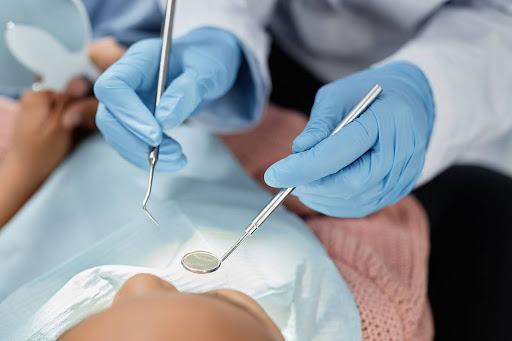Wisdom tooth extraction is a simpler procedure for fully emerged teeth, while wisdom tooth surgery is needed for impacted or partially erupted teeth and involves more complex techniques. The main difference is that wisdom tooth surgery is more intricate and has a longer recovery time.
If you are unsure whether you need wisdom tooth extraction or wisdom tooth surgery, your dentist will assess key factors like the position, condition, and alignment of your wisdom teeth, along with the severity of any symptoms you are experiencing.
Need your wisdom tooth removed? Contact The Braces Practice now to book an appointment!
(Source: Envato)
Wisdom Tooth Surgery vs Wisdom Tooth Extraction
Knowing the difference between a simple wisdom tooth extraction and surgery is important because it helps you know what to expect, so you can work with your dentist to choose the best option for your situation, making sure the treatment is effective and recovery goes smoothly.
- Complexity of Procedure
-
- Wisdom tooth extraction is a straightforward procedure for teeth that have fully emerged and are easy to reach.
- On the other hand, wisdom tooth surgery is needed when teeth are impacted, partially erupted, or located beneath the gumline. This involves making an incision and, in some cases, removing bone to access and remove the teeth.
- Type of Anaesthesia Used
-
- Wisdom tooth extraction is usually performed under local anaesthesia, numbing only the area around the tooth.
- In contrast, wisdom tooth surgery may require local anaesthesia, sedation, or even general anaesthesia, depending on the complexity of the procedure and the position of the teeth.
- Recovery Time
-
- Wisdom tooth extraction typically has a quicker recovery time, with most people healing within a few days.
- Wisdom tooth surgery, however, requires a longer healing period, usually taking one to two weeks due to the procedure’s complexity.
- Potential Risks and Complications
- Both procedures carry risks like swelling, bleeding, or infection. Surgery has a slightly higher risk due to its complexity.
(Source: Envato)
Defining Wisdom Tooth Extraction and Surgery
What Is Wisdom Tooth Extraction?
Wisdom tooth extraction involves removing a fully or partially erupted wisdom tooth. It is a quick and minimally intrusive procedure. Dentists recommend extractions when:
- The tooth has fully erupted but is causing crowding.
- Decay or damage makes the tooth unsalvageable.
- The tooth is in an awkward position but accessible.
What Is Wisdom Tooth Surgery?
Wisdom tooth surgery is required when the position of the wisdom tooth causes it to be impacted or trapped beneath the gums. Dentists use advanced techniques to remove the tooth safely, as it requires more intricate procedures than a simple extraction.
Types of Wisdom Tooth Surgeries:
- Surgical Extraction with Bone Removal
For deeply impacted wisdom teeth trapped under the gums and bone, this procedure is necessary when the tooth is growing at an angle or has not fully emerged.
The surgeon removes part of the surrounding bone, makes an incision, and uses tools to break the tooth into pieces for easier removal.
- Surgical Extraction without Bone Removal
This procedure is used for moderately impacted teeth, where the tooth is partially covered by gum tissue but not completely embedded in the bone.
Your dentist will make a small incision to expose the tooth, which is then loosened and lifted out. No bone removal is needed, making it simpler than deeper impactions.
- Piezoelectric Surgery
Ideal for complex cases where precision is essential, this method is used for wisdom teeth located near nerves or delicate bone structures.
The ultrasonic vibrations ensure that the tooth is gently detached from its surrounding tissue, with minimal impact. It is a safer and more controlled approach that leads to faster healing and less discomfort after surgery.
- Laser Assisted Surgery
Laser-assisted surgery is a cutting-edge, minimally invasive technique that uses a laser to cut through the gum tissue with pinpoint accuracy.
The laser not only exposes the tooth but also helps to seal blood vessels, reducing bleeding and swelling. It is ideal for patients who need a more delicate approach with quicker recovery times.
(Source: Envato)
Which Procedure Is Right for You?
Your dentist will decide based on:
-
The placement and state of your wisdom teeth
-
- Placement: If your wisdom teeth are growing at an angle, or are partially erupted (only coming through the gum), they can be difficult to clean properly, which increases the risk of infection or decay.
If the teeth are lying horizontally or are impacted (stuck beneath the gum), it can cause discomfort and other complications. These conditions often require wisdom tooth surgery to prevent future issues.
On the other hand, if your wisdom teeth are fully erupted and positioned normally, a simple extraction may be all that is needed. - State: If your wisdom teeth are decaying, infected, or damaged, they might need to be removed.
If the teeth are too difficult to access for proper cleaning, or if they have developed cavities or other dental problems, wisdom tooth surgery could be necessary.
However, if the teeth are in good condition and fully erupted, a simple extraction would likely suffice.
- Placement: If your wisdom teeth are growing at an angle, or are partially erupted (only coming through the gum), they can be difficult to clean properly, which increases the risk of infection or decay.
-
Severity of pain and potential complications
-
- Pain: If you are experiencing constant or severe pain at the back of your mouth, it could indicate that your wisdom teeth are putting pressure on nearby teeth or gums.
If the pain is persistent or worsens over time, it might signal the need for wisdom tooth surgery or a wisdom tooth extraction, depending on the position and condition of the teeth. - Complications: Sometimes, wisdom teeth can lead to infections, cysts, or even damage to adjacent teeth.
If the teeth are causing swelling, infection, or other dental issues, wisdom tooth surgery may be required to address the complications.
For fully erupted wisdom teeth that are causing minor issues, a simple wisdom tooth extraction may be an effective solution.
- Pain: If you are experiencing constant or severe pain at the back of your mouth, it could indicate that your wisdom teeth are putting pressure on nearby teeth or gums.
-
Your overall dental and medical health
-
- Dental Health: Your dentist will assess the health of your teeth and gums. If you have a healthy mouth with no signs of gum disease or other dental issues, you might be a candidate for a simple extraction.
However, if your mouth has existing dental problems like gum disease, cavities, or misalignment, wisdom tooth surgery may be necessary to ensure the teeth are removed properly. - Medical Health: Your general health matters too. If you have medical conditions like heart disease, diabetes, or blood clotting disorders, this will influence whether wisdom tooth surgery or a simple extraction is recommended.
Generally, healthy individuals recover better from either procedure, but those with medical concerns may require special consideration.
- Dental Health: Your dentist will assess the health of your teeth and gums. If you have a healthy mouth with no signs of gum disease or other dental issues, you might be a candidate for a simple extraction.
(Source: Envato)
FAQs About Wisdom Tooth Extraction and Wisdom Tooth Surgery
1. Is the procedure painful?
Thanks to anesthesia, you would not feel pain during either procedure. Any discomfort following the procedure can be alleviated with medication provided by your dentist.
2. How long does it take to recover?
The recovery timeline for wisdom tooth extraction is typically 2-4 days, while wisdom tooth surgery may take 1 to 2 weeks.
3. Can I eat after the procedure?
Stick to soft foods and avoid hot or spicy meals for a few days.
4. Can I drive myself home?
After simple extractions, yes. For surgery under sedation, arrange for someone to drive you.
5. Can I smoke after the procedure?
Refrain from smoking, as it can slow down healing and raise the risk of complications, such as dry socket.
6. What if I experience severe pain or swelling?
Contact your dentist immediately. Severe pain or swelling could indicate infection or complications.
Conclusion
Wisdom tooth surgery and wisdom tooth extraction serve the same purpose: to relieve pain and prevent dental issues. The right procedure depends on the condition of your wisdom teeth. Trust your dentist’s expertise and follow their advice for a smooth recovery. Whichever path you take, rest assured that you are prioritising your oral health.
Need your wisdom tooth removed? Contact The Braces Practice now to get an assessment!












